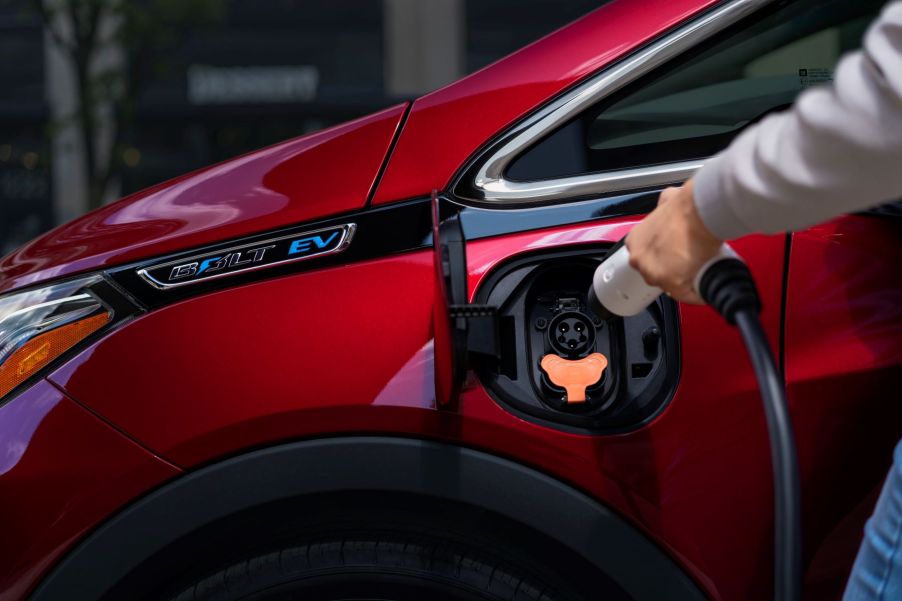
Chevy Bolt Owners: Follow These 3 Steps to Avoid Dangerous Battery Fires Until Your Recalled EV Is Fixed
You expect your car to be safe and reliable, especially when it isn’t being driven. However, some owners of Chevrolet Bolt models have had their cars catch on fire due to defective batteries. General Motors is still working on getting to the bottom of the issues, but there are three steps owners can follow to avoid dangerous battery fires in their Chevy Bolt.
The recalls on Chevy Bolt EV’s battery modules

It takes a lot of the magic out of owning a car if it’s prone to catching on fire. The Chevrolet Bolt now has two recalls connected to issues with its battery modules. The Bolt’s 60.0 kWh lithium-ion battery pack, located under the passenger seat, can also catch on fire, which could then spread to the entire car.
The fire risk comes from a torn anode tab and a folded separator located in the battery modules. However, GM, the parent company of Chevrolet, doesn’t yet know which step of the manufacturing process causes the problems or whether the issues appear in all Bolts or just a handful of models.
Due to the uncertainty, recalls have been called affecting model years 2017 through 2022 of the Bolt EV and Bolt EUV. The NHTSA issued the initial recall in November 2020 for model years 2017 through 2019. Chevrolet thought a software update limiting charging capacities could correct the problem, but fires continued occurring. A second recall, issued in July 2021, expanded the recall to include additional model years, affecting about 141,000 vehicles worldwide, reports The Bakersfield Californian. General Motors could lose more than $1.8 billion because of these Chevy Bolt recalls.
Three steps owners should follow to prevent Chevy Bolt battery fires
According to The Bakersfield Californian, people who own a Chevrolet Bolt have steps to take at home to help prevent battery fires. Bolt owners should:
- Only charge the car to 90%.
- Not deplete the battery below 70 miles.
- Not park the car in a garage, and not charge the car overnight.
General Motors and LG Chem, the battery’s supplier, are working to locate the cause of the battery problems. Once that is figured out, and replacement batteries can be manufactured, GM will contact Bolt owners and make repairs. Once the recall repairs are completed, these precautions shouldn’t be as necessary.
More info for Chevrolet Bolt owners
It’s not easy to wait for the answers and a fix, so Chevy Bolt owners likely have various questions. Owners may be worried that it will take several months before their Bolt’s can be fixed, and, unfortunately, this could be the case. General Motors is waiting to make repairs until it is certain its replacement parts won’t have defects. According to The Bakersfield Californian, GM is working on production efficiency to ensure that replacement parts can be produced and distributed as quickly as possible. Once new battery modules are available, they will have an 8-year/100,000-mile warranty that begins when the new modules are installed.
Owners who have deals with their electric companies for reduced electricity costs overnight will end up paying extra for charging during the day, as recommended, instead. General Motors is reviewing owner requests for reimbursement on a case-by-case basis. It’s too soon to know if the Bolt’s increased fire risk will lead to increased insurance rates. As for owners of new 2021 or 2022 Chevy Bolts who may be hoping to get rid of their new cars, GM makes case-by-case decisions for both purchased and leased Bolts to be traded or repurchased.
Owners with additional questions can call their Chevrolet dealership or the Chevrolet EV Concierge at 833-EVCHEVY (Monday through Friday, 8 a.m. to 12 a.m., and Saturday and Sunday, 12 p.m. to 9 p.m.).
For now, Chevrolet Bolt owners should be sure to follow the precautionary steps to help prevent dangerous battery fires. As soon as a fix is available, GM will be in touch with owners to make the car batteries safe again.


